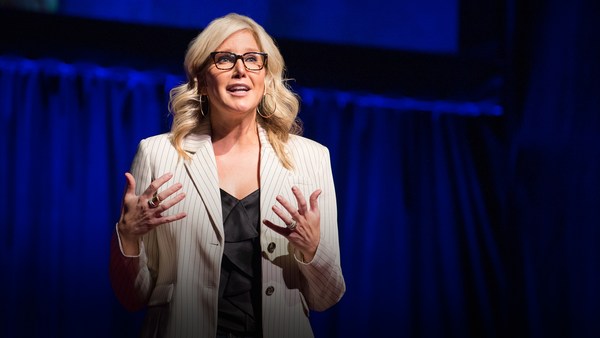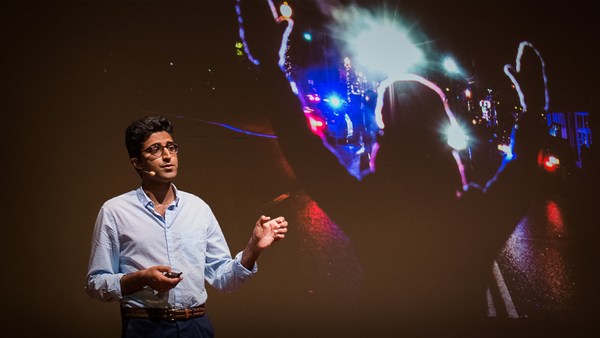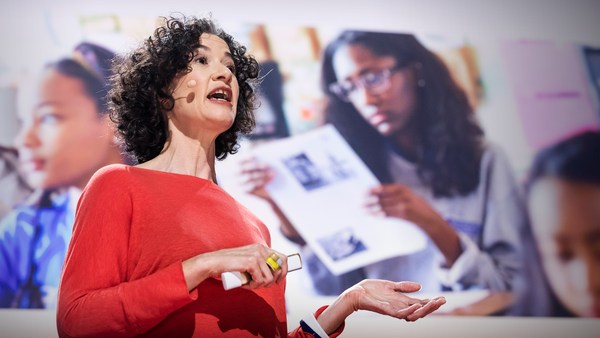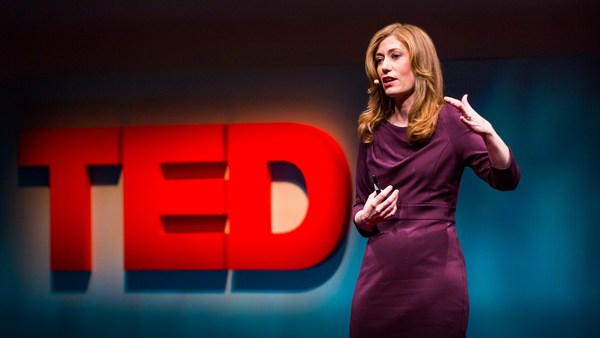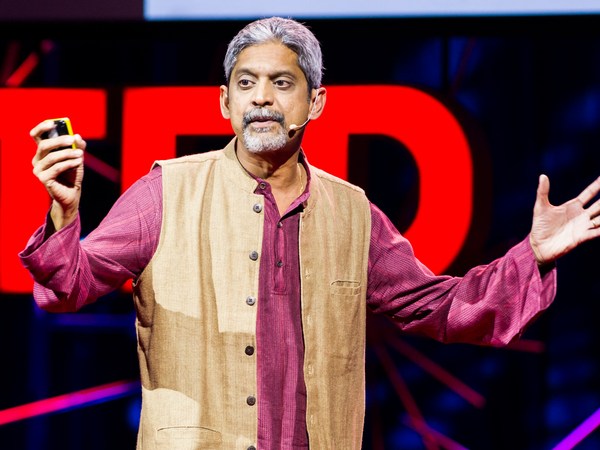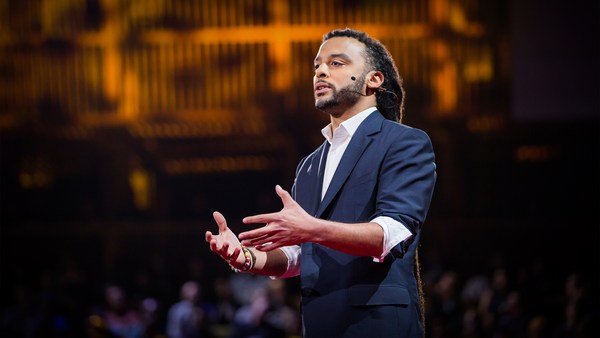Call me weird, but I love a good ride-along. Like, love them. I've been on ride-alongs across the world -- in Amsterdam, in Canada, in Boston, and even right here, in Denver. And what I've learned is that people call the cops for a number of reasons -- anything from a lost cat, to a neighbor they just want to know more about, to maybe a loved one or a stranger having a mental health crisis. But really, at the heart of it, people call 9-1-1 because they just don't know what else to do.
What I've learned, though, is that sometimes, when you call 9-1-1, it can make a bad situation even worse. Maybe a loved one is arrested, or they're placed on a 72-hour hold; there are fines and fees, and criminal charges. And sometimes, calling 9-1-1 can be the beginning of the end of someone's life. Now, you might think I'm here to talk about abolishing the police. Not exactly. I'm actually here to talk about a different solution, a solution that takes care of a person, keeps our community safe and helps the police to focus on what they do best -- enforcing the laws.
For me, it all started with a visit to Eugene, Oregon. You see, I had just passed a ballot measure here in Denver, called Caring for Denver, to provide more mental health and substance use services for people in crisis right here, in Denver, when a friend tipped me off to a program in Eugene. Normally, when you call 9-1-1, you get a firefighter, a police officer or a paramedic. But in Eugene, there's a fourth option: a mental health professional and an EMT, who ride along in a van and respond to mental health calls. The program is called CAHOOTS.
Studies show that nearly 50 percent of victims of police brutality have a disability, predominantly a mental health disability. We have a huge problem with mental health in this country. The fact of the matter is police simply don't have the tools to respond to a mental health crisis. And we've seen that when we don't adequately fund mental health and substance use services, and use our jails and our prisons as de facto mental health clinics, we actually end up in much worse situations, and people's mental health is no better for it.
So, I went along to Eugene to learn more. I went through a training, and then -- yay, finally -- another ride-along. I got in the van and went with the CAHOOTS team. About 20 minutes into our call, we were called to respond to a man in a mental health crisis. Immediately, I was shocked at how nice the neighborhood was. Middle-income neighborhood, kids out playing -- there was even a young boy on a tricycle in the driveway. It was just a normal day.
We met up with a woman, who was the wife, and we asked her what was going on. She informed us that her husband was locked in the bathroom, and he was talking about ending his life. He had box cutters. We went inside to talk to him, and he explained to us, through a closed door, that he simply couldn't do it anymore. He was erratic. He said he wasn't going to put his family through these burdens anymore, and he just wanted it to end. We talked to him through that closed door for nearly an hour. And in the end, he just wouldn't come out. So, we left.
About 30 minutes after leaving, we were called to come back on scene. You see, the police had been called. He had box cutters -- a weapon. But they knew we had been there first. So the police, they waited for us. We got there, and the police were able to convince the man to turn over his box cutters. He got dressed, and he came out of the bathroom. And then, something magical happened. You see, the police started to retreat down the stairs. The CAHOOTS team, they stepped up. They got the man to sit on the couch and talk to them. And then, they knelt down to his eye level, because he wasn't a threat, and neither were they.
We sat there and we talked for about three hours. Now, I was back a little bit. And I could see, on a desk that they had in the hallway, piles and piles of papers. Unpaid medical bills. I knew what he was going through. The CAHOOTS team talked to him about his financial burdens, they talked to him about resources, and they eventually made a plan to get him to help the next day. He even ate a sandwich, and they took his vitals the entire time. When we left, he was a different person, and so was I.
Sadly, the situation is all too familiar for me. You see, my sister has been in and out of the criminal justice system for about 30 years. You know, we thought she was “just an addict.” Later, we found out that she had untreated trauma from a sexual assault. We didn't know what to do, we didn't know how to help her. So when I flew back to Denver, I thought about my sister, I thought about this man, and I knew we could do better in Denver.
What intrigued me so much about Eugene is that the police and the mental health crisis team, they work together -- in cahoots. An elite team of specialists trained to respond to people having a mental health or substance use crisis. See, it was the police that convinced the man to surrender the box cutters. But it was the CAHOOTS team that stepped up, connected the man to resources and listened. You see, I have been fighting for criminal justice reform my entire career. And sometimes, it can seem so daunting. There are 7,000 prisons and jails across the United States, 2.3 million inmates. For millions of Americans -- judges, attorneys, correctional officers, cops -- mass incarceration is a livelihood. To fix the criminal justice system, we must look critically at every piece of the puzzle. Find out what's working and fix what's not. If there is one thing that's clearly not working, it's the one-size-fits-all approach. Outside of Eugene, Oregon, that man would have been placed on a 72-hour hold. He could have been incarcerated, he might even have died. He would have been under more financial stress and burden, and his mental health would have been no better. Two million people are booked into jails and prisons every year. And the National Alliance for Mental Health, they've reported that 83 percent of these folks don't have access to mental health care.
A well-functioning criminal justice system uses the right tool at the right time. Why are we asking our police and our prisons to fix our mental health crisis? That's not what they do. Eugene uses the standard system of triage. What's happening right now? And what does the person need, right now? But then, they have the tools to back it up. A team of trained professionals, who have the time, resources and energy to get the person to the services they need.
Denver launched our co-responsemodel in 2016. We launched STAR, baby CAHOOTS, in June. Today, we have 22 co-responders, mental health professionals who ride along with law-enforcement officers. We have 11 caseworkers. In addition, we dispatch the STAR team, a paramedic and a mental health professional in a mobile crisis unit, who are trained to deal with someone in a mental health emergency. They stabilize them, they de-escalate the situation, and they connect someone with the resources that they need, ongoing care. So far, the results have been nothing short of miraculous. STAR has had a thousand calls since June. They have had to call the police for backup zero times.
Additionally, the Co-Responder model has led to a less than two percent rate of tickets or citations. And the best part -- the cops love it. In fact, the thing I hear the most is "Why don't we have STAR in my precinct yet?" Cops are even working alongside of co-responders to deal with their own mental health traumas. They're talking through their issues with people that they actually trust. And we found this not only makes law enforcement officers safer, but it keeps the profession safer as a whole. We called the foundation Caring for Denver because caring is at the heart of it. We care about the people, we listen to their concerns, and we connect folks with the resources that they need. It's a kind approach to criminal justice, yes. But it's also a logical one.
Not every problem can be solved by the police, and not everyone should go to jail. When we talk about criminal justice, what we're really talking about is people. People are at the heart of it. We deserve a better approach, one with empathy and humanity. So let's be smart about criminal justice. and use the right tool at the right time.
Thank you.
